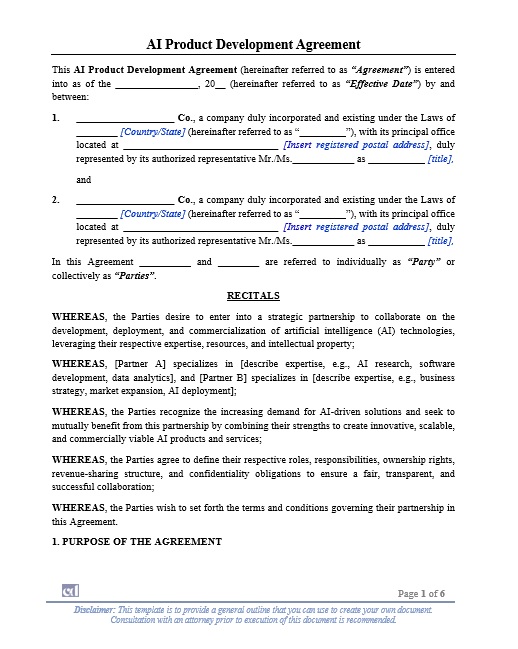Estimated reading time: 3 minutes
The Purpose of an AI Product Development Agreement
Artificial intelligence (AI) continues to reshape industries. Businesses must secure clear agreements to ensure successful AI product development and commercialization. A well-defined AI Product Development Agreement sets the foundation for collaboration, ownership, and revenue sharing.

An AI Product Development Agreement should outline each party’s roles. It must specify responsibilities in research, coding, data handling, and software deployment. Ownership of intellectual property must be clearly stated to avoid future disputes. Additionally, revenue-sharing models should be fair and transparent.
Why Businesses Need This Agreement
AI projects often involve multiple stakeholders. A structured agreement prevents misunderstandings and protects both parties. This ensures smooth cooperation between developers, investors, and commercial partners. Furthermore, a contract establishes liability measures to manage risks effectively.
Commercialization Strategies in AI Development
Bringing an AI product to market requires a solid plan. The agreement should define licensing terms, marketing strategies, and distribution rights. This helps maximize profitability while protecting each party’s interests. Moreover, compliance with industry regulations should be a priority.
A McKinsey study found that AI adoption has increased corporate profits by up to 20% in companies with strong commercialization strategies. This underscores the importance of having clear legal agreements in place.
Ensuring Long-Term Success
A well-structured agreement promotes sustainable AI innovation. It encourages fair collaboration and long-term partnerships. Regular updates to the contract ensure alignment with technological advancements. Ultimately, a strong AI collaboration agreement paves the way for success in a competitive market.
Conclusion: The Growing Need for AI Agreements
The AI market is projected to reach $1.8 trillion by 2030, according to Statista. With the rapid expansion of AI across industries, companies must establish legal safeguards. A robust AI collaboration agreement not only enhances innovation but also protects intellectual property, ensures fair revenue distribution, and mitigates disputes. As AI continues to evolve, having a structured agreement will be a crucial factor in determining a company’s long-term success.
Check out more pages of our website for related content:
- AI Non-Disclosure Agreement (AI NDA)
- AI Service Agreement
- AI Technology Collaboration Agreement
- AI Software License Agreement
- AI & Digital Transformation Consulting Agreement
- AI Development & Training Service Agreement
- AI Data-Sharing Agreement for Open AI Model Development
Access the Full Contract Directory Index
You can browse the complete alphabetical list of all commercial, financial, and project-based contract templates by visiting our A–Z Contract Index.
References
- LexisNexis — Artificial Intelligence (AI) Agreements Checklist – This article outlines the essential legal elements that must be included in AI development contracts, such as scope, deliverables, data rights, and risk allocation.
- Tech Contracts Academy — Gen‑AI Contracts Cheat‑Sheet – This resource provides a structured checklist of questions and considerations for drafting AI development agreements, including training data rights, IP ownership, and model behavior risks. …
has been added to your cart!
have been added to your cart!



